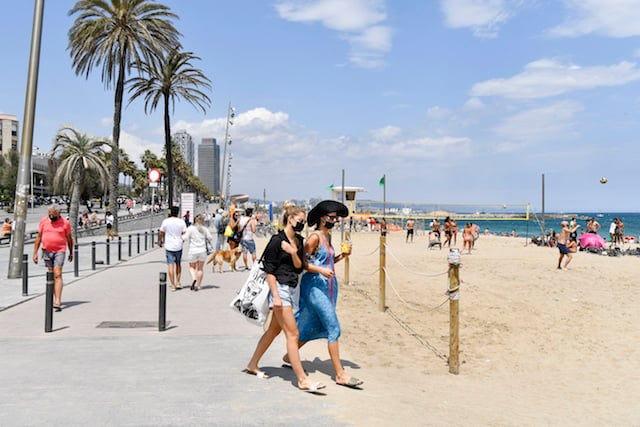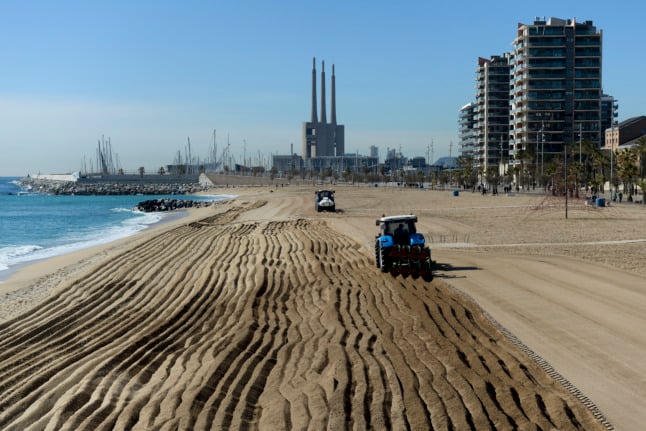The vow came after talks in Barcelona between Sanchez and Catalan president Quim Torra amid simmering tensions in the wake of Catalonia's failed bid to break away from Spain last year.
It was the first meeting between the two since Madrid talks in July a month after Sanchez came to power.
In a rare joint statement issued after their talks, Spain's central government and the regional government of Catalonia affirmed their commitment to “an effective dialogue which will lead to a political proposal which has widespread support among Catalan society” which will “guarantee a solution” to the Catalan crisis.
ANALYSIS: What's likely to happen when Spain's government heads to Barcelona?
The two sides have “significant differences regarding the origins, the nature and the paths to resolution” of the “conflict”, the statement added.
Sanchez, who heads a minority Socialist government which needs the support of Catalan separatist parties to pass legislation, and Torra may meet again in January after the Christmas holidays, Catalan government spokeswoman Elsa Artadi told a news conference after their meeting.
Apostamos por el #diálogo para encontrar una solución para Cataluña y atender a las necesidades de la ciudadanía. Hoy me he reunido en el Palacio de Pedralbes de Barcelona con el president de la Generalitat, @QuimTorraiPla. Aquí, el comunicado conjunto: https://t.co/CwFpQVdwOA pic.twitter.com/FLthoohzP8
— Pedro Sánchez (@sanchezcastejon) December 20, 2018
'Humiliation'
The meeting was swiftly criticised by conservative parties, with the leader of Ciudadanos, Albert Rivera, calling it a “humiliation” and a “historical irresponsibility”.
“Sanchez treats a supremacist who encourages violence and wants to destroy Spain as a head of state,” he added in a tweet.
Sanchez took office in June after winning a surprise vote of no-confidence against the previous conservative government with the support of Catalan separatist parties, eight months after Catalonia in October 2017 pushed ahead with an independence referendum despite a court ban and then declared independence based on the result to no avail.
He initially adopted a more conciliatory tone towards Catalonia than his conservative predecessor.
But his position hardened after far-right party Vox, which takes a tough line against Catalan separatism, won seats for the first time in a December 2nd regional parliament poll in Andalusia, a Socialist stronghold.
During a recent debate, in parliament Sanchez compared Catalonia's secession drive to Britain's campaign to leave the European Union. Both movements were built on “a tale of invented grievances, magnified by manipulation”, he said.
Catalan separatists also announced that they would not vote in favour of Sanchez's 2019 budget after public prosecutors in November called for stiff prison sentences for 18 Catalan separatist leaders facing trial early next year over Catalonia's failed separatist bid.
In a first sign of a thaw, Catalan separatist parties on Thursday voted in favour of the central government's deficit targets underpinning the 2019 budget in the Spanish parliament.
But the separatist parties stressed that this “gesture” did not mean that they would back the budget itself.
'Ungovernable'
Sanchez will hold a meeting of his cabinet in Barcelona on Friday, which has angered many separatists.
Friday's cabinet meeting comes a year to the day after Madrid held snap elections in Catalonia after blocking the move for independence and many separatists have called the timing of the meeting “a provocation”.
Grassroots separatist organisation ANC, which has previously staged massive pro-independence street demonstrations in Barcelona, has urged supporters to block the streets of Barcelona with their vehicles and to march on Friday.
A radical separatist group, the Committees for the Defence of the Republic (CDRs), has vowed to prevent Sanchez's cabinet meeting from going ahead on Friday.
“We will be ungovernable on December 21st,” the group said in a tweet alongside a picture of Spain's King Felipe VI on fire.
Thousands of police will be deployed to provide security in Barcelona amid fears extreme elements of the independence movement could foment violence.
Against this backdrop, four jailed Catalan separatist leaders awaiting trial over their role in last year's separatist bid, on Thursday called off a hunger strike they began at the beginning of December.
ANALYSIS: What's likely to happen when Spain's government heads to Barcelona?





 Please whitelist us to continue reading.
Please whitelist us to continue reading.